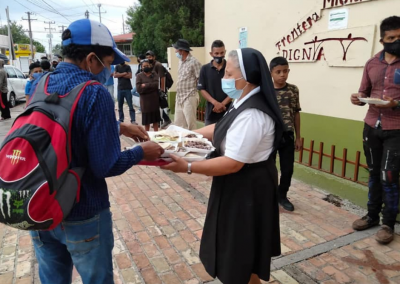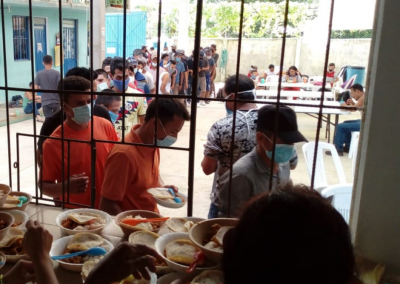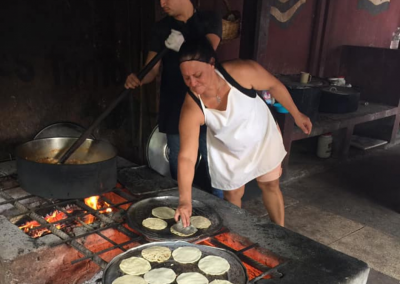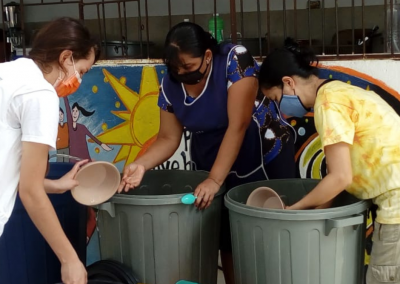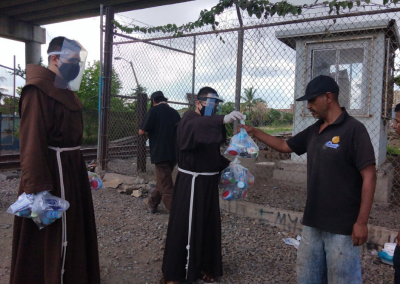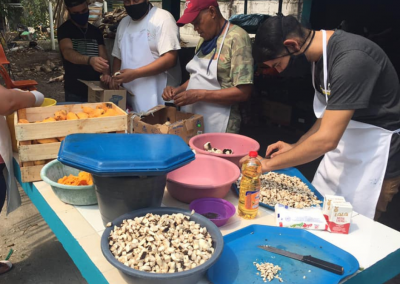For the Central American population, the situation is complex. As always, the governments of the day strive for their own interests, partisan politics, and their desire to accumulate wealth, and are not attentive to responding to the right to food of society.
The Christian religion is embodied in the history of the different congregations and churches. Many of these communities of faith have absolutized their doctrine, worship and religious regulations, often leaving in the background faith in Jesus Christ, which is centered on following the person of Jesus, and assuming his life project: the Good News of the kingdom of God. It is from the encounter with Jesus in our daily lives and in the Gospels that we come across his words and gestures. Following this spiritual path, Jesus said that he would be present in history in every oppressed, the needy and defenseless human being, “Because I was hungry, and you gave me food; I was thirsty, and you gave me drink ”Mt 25,35. If we feed the hungry or if we are concerned about the hunger of the impoverished majorities, from the Christian faith, we are doing it to Jesus himself.
The Food and Agriculture Organization determined that, “Hunger and food insecurity are global problems. According to the State of Food Security and Nutrition in the World (2019), more than 820 million people in the world are still hungry in 2018 ” [1] When this problem is defined, the deficiency of the member states is obvious. In their policies and actions they are not complying as they are not facilitating access to food, and not vigilant against individuals or companies that are impeding the population’s access to a quantitative and qualitative food that provides quality of nutrition in families or individuals.
For the Central American population, the situation is complex. As always, the governments of the day strive for their own interests, partisan politics, and their desire to accumulate wealth, and are not attentive to responding to the right to food of society. The FAO states that, “Guatemala, Honduras and El Salvador are at higher food risk because many households lost food reserves due to hurricanes Eta and Iota. Along with that, there is a reduction in employment due to the pandemic, especially in the informal sector, with loss of income and less access to food. ”[2] The quality and access to food in this region has been getting worse every year due to the climatic situation that causes the “dry corridor” in which a large number of the population of these countries live. And on top of that, we can add the impact of the Covid-19 pandemic.[3]
In this reality of the Central American peoples, there are specific faces, names, families and homes that, when they find themselves in a state of hunger must forcibly migrate. In the thousands who are forced to migrate from the countries of Guatemala, El Salvador, Honduras and Nicaragua, the cause indicated is the impoverishment of households, where poor quality and access to adequate food is implicit, that is, access to the basic food basket. FAO considers it essential that these states work to promote food and agricultural sustainability.[4]
The migrant forced to leave his land, bears the pain of leaving that place where he was born. In most migrants there is a “hungry” stomach, a human being who did not find a way to feed his family in his country of origin. Each migrant carries the dream of finding lands where “milk and honey” abound, where there is plenty of food to live on. The states are called by the law itself, to recognize the dignity of each human being and not to exclude any human group from the necessary and quality food. It is about including, not marginalizing or denying the right to food to all populations, including migrants who arrive in their countries. [5]
I have in mind the different refuges or places of the Franciscan Network on Migration where they share the table with the migrant, where there are “fish and loaves” that multiply (Jn 6).
I end by taking up the promise that the prophet Isaiah pronounced to the people of God when he returned from exile and from being a foreigner in foreign lands (Ps 125). The prophet addresses a few words of hope to the people who were forced to migrate, this is what God says to his migrant people, “to see you who are thirsty, come to the waters! It does not matter that they are without money, come; ask for wheat without money, and eat, ask for wine and milk, without paying ” Is 55,1. Today we make these prophetic words our own, which renew hope as we walk with our migrant brothers and sisters.
René Arturo Flores, OFM
RFM – El Salvador Team
______________________________________
[1] https://www.ohchr.org/SP/Issues/Food/Pages/FoodIndex.aspx
[2] https://www.estrategiaynegocios.net/lasclavesdeldia/1453135-330/fao-habr%C3%A1-aumento-de-hambre-aguda-en-centroam%C3%A9rica
[3] https://www.oxfamintermon.org/es/publicacion/rostros-hambre-centroamerica?hsLang=es
[4] https://www.fao.org/migration/en/
[5] https://www.ohchr.org/EN/Issues/Food/Pages/AboutHRFood.aspx


